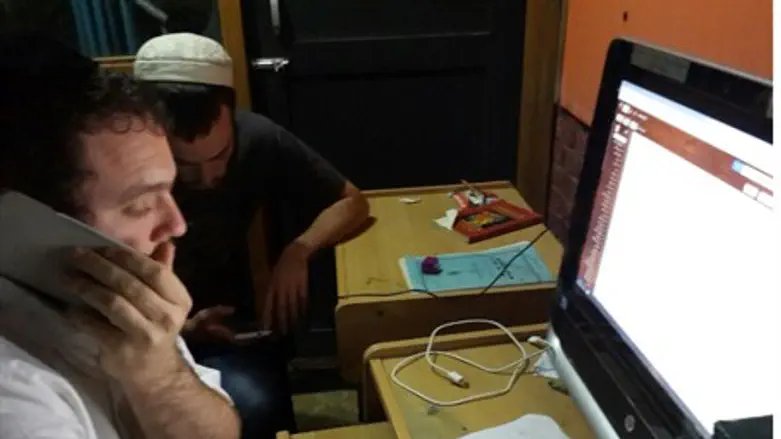
Emotions are running high in Nepal, Rabbi Hezki Lifshitz, the Chabad Lubavtich envoy in Kathmandu, stated in an Arutz Sheva interview Sunday, as a search-and-rescue effort for survivors of last week's avalanche continues.
"There is an Air Force delegation here to assist trauma victims," Lifshitz noted. He escorted injured Israelis to local hospitals and to the airport to arrive in Israel for medical treatment. "People continue to flow to the area at all times, but there are still a number of missing persons - an, as you know, we are all fearing for the life of one of them."
Lifshitz was referring to Michal Gili Chierkowsky, from Givatayim, whose family fears she may be trapped without aid supplies or communications equipment at 5,000 meters (approximately 16,000 feet) high along the mountain pass. Chierkowsky's family told the press Saturday night that they are "praying for a miracle."
There may be more like her, Lifshitz said. But he remained optimistic.
"There are some who may be missing because we lost contact with them, who may be in a safe place and are simply waiting for the [snow] drift level to fall," he said.
Meanwhile, survivors face another avalanche: emotional trauma.
"Over Shabbat and the holiday [Thursday - Simchat Torah - ed.] we made kiddush in the hospital for the injured, and had mixed feelings of joy and sorrow," he recounted. "[There is] joy for those who survived and sadness for those who did not. There were those who understood that if they stayed with their friends they would die, and there were those who helped their friends but were killed [in the process]."
Tourism and hikes along the Thorong pass, and in Nepal in general, have stopped as travelers assess the situation.
"Most people are debating whether they want to take that hike, or a different hike, or return to Israel," Lifshitz stated. "Everyone is in shock, because everyone knew everyone else. We're still waiting for good news, but until then, there are forty people dead here."
"We tried to celebrate the holiday, but there were such mixed feelings," he added. "There were people whom we saw on Yom Kippur [last week - ed.] and left the next day for a hike, with the intent to return on Simhat Torah."
"Unfortunately, not all of them came back."
Lifshitz also addressed reports of a tour guide who allegedly died after charging tourists money to save them.
"They took cover in a sort of tea house which is at the highest point along the trail," Lifshitz said. Breathable air at sea level has about 21% oxygen; air at the highest point reduces this by half. "The tea house owner offered to take them down - but for a price. He was apparently experienced in trekking through heavy snow. The tourists paid him and they shuffled through the blizzard, and he disappeared in the whiteout."
"It's hard to judge people in situations like this," Lifshitz affirmed. "What is clear is that, if he's still out there, he's dead."
Lifshitz is familiar with the trek itself, and claims that it would have been possible to save more people if travelers had been notified about the oncoming storm.
The avalanche was atypical for the season, however, and he predicts that the issue became simply an error of unpreparedness.
"This period is characterized by pleasant weather, so people do not equip themselves with lifesaving tools, like a thermal blanket," he said. "Cyclones rarely come from eastern India to Nepal. But unfortunately, no one saw the forecast and alerted the hikers."
"It's probable that the tourism industries charged money to announce the news; there are many accusations flying over the disaster," he continued.
Between 30-40 people have been killed and 60 people are missing after the avalanche, military and police officials said Saturday night.